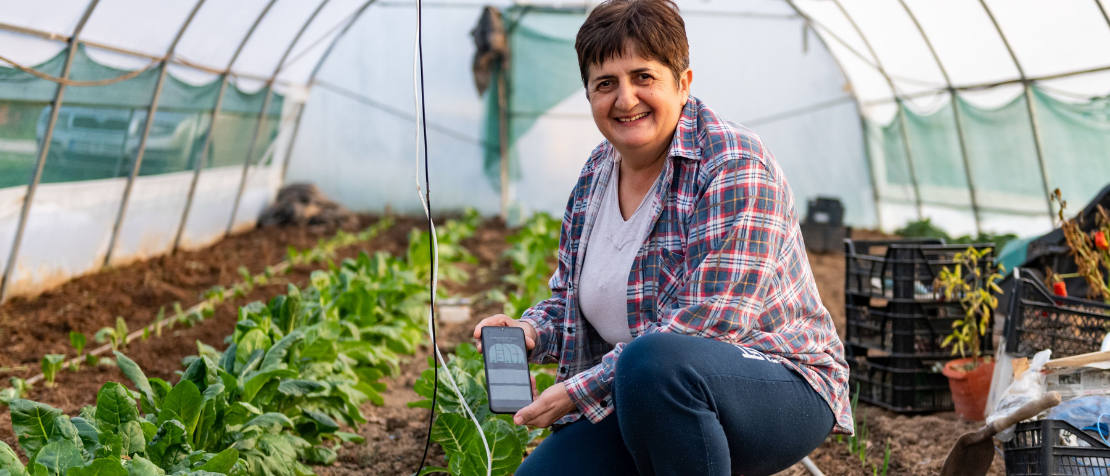Digital village hubs can transform quality of life in rural Europe and Central Asia

©FAO/Imrana Kapetanovic
In 2021, the Food and Agriculture Organization of the United Nation (FAO) launched the global Digital Villages Initiative to promote digital innovations to rural communities. Now the initiative is being scaled up in Europe and Central Asia, aiming to improve livelihoods, wellbeing, and social cohesion in this region.
The virtual event ’Digital villages in action in Europe and Central Asia’ will launch the Digital Villages Initiative today in eight countries across the region. Building on past achievements and good practices of digital agriculture, the initiative will support digital rural transformation in Albania, Azerbaijan, Bosnia and Herzegovina, Georgia, Kyrgyzstan, Tajikistan, Türkiye, and Uzbekistan to address agrifood systems’ challenges and improve the economic situation and resilience of rural communities.
High-level officials from the selected countries will share their approaches, tailored to local realities, for promoting the initiative in their respective countries. The event will provide a showcase for country experiences, including presentations of interim results, good practices, and achievements in the field of digital agriculture as baseline for the implementation of the initiative.
“In this region, the vision of the Digital Villages Initiative is to empower rural communities in a participatory manner and help them apply digital technologies and leverage their strengths,” said Daniela Di Gianantonio, FAO Digital Agriculture Team Leader for Europe and Central Asia. “We want to contribute to a long-lasting change.”
Rural areas are suffering from the socio-economic consequences of negative demographic trends, most notably the aging population and out-migration. Digital solutions and innovations have the potential to create better incomes and living conditions for rural populations and reverse the unfavourable trends.
“The adoption of digital technologies is one of the strong catalysts of transformative processes that also promote rural development – from improved access to services, to better farm management and decision-making, and, in general, increased efficiency, agricultural productivity, and new opportunities” added Dejan Jakovljevic, FAO Chief Information Officer.
Specifically, digitalization of a village can entail, among other activities, the uptake of smart solutions in agricultural production, the delivery of digital services to rural people, developing human capital through digital literacy programmes or ‘digital farm labs’ as demonstration plots for information and communications technology in agriculture.
The FAO initiative focuses on scalable innovations and digital solutions based on innovative technologies and an enabling environment to facilitate the dissemination of data, information, and knowledge, and to support equal access to the benefits of innovations for farmers and smallholders. Covering the period until 2024, the focus of assistance is on smallholders and the entire rural community to increase competitiveness, enhance access to natural resources, and improve market access and rural livelihoods.
Building upon the experiences of smart villages and town-twinning in Europe, through the Digital Villages Initiative, FAO will help establish linkages in other parts of the region that have the aspiration of becoming digital hubs. Through this “DVI-twinning” approach, rural communities are encouraged to establish long-term collaborations for exchanging knowledge, proven practices, and technologies. They will also benefit from tailored support to rural development and increased availability of financial resources to the application of digital technologies, with special attention to vulnerable populations.
In the future, a Digital Villages Initiative platform will provide a virtual venue where rural communities can foster regional linkages, exchange knowledge and, create an online community of villages.
18 May 2023, Budapest, Hungary
Event: Digital Villages in Action in Europe and Central Asia
Publication: Status of digital agriculture in 18 countries of Europe and Central Asia
Digitalizing cows in Georgia
Knowledge, innovation and digitalization can transform agriculture in Uzbekistan
Tajikistan on the road to digital agriculture
Digital technologies: key accelerator of agrifood systems transformation and rural development
